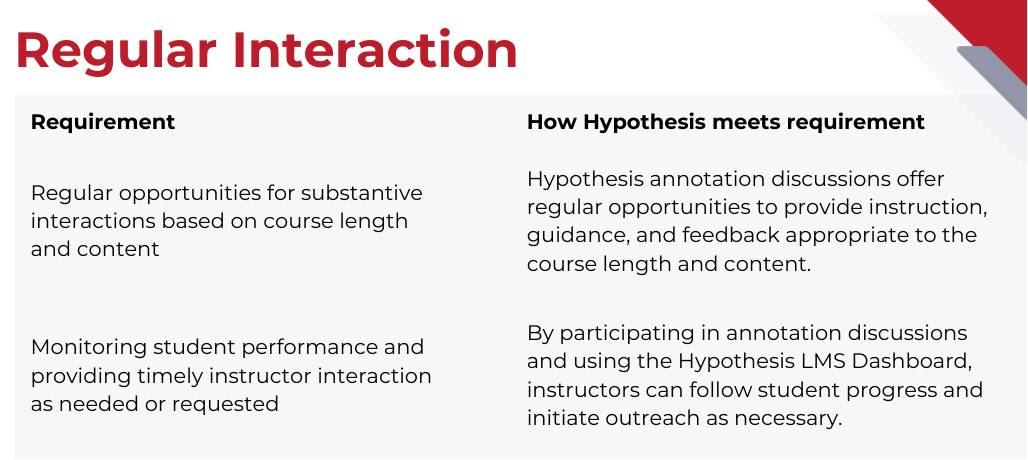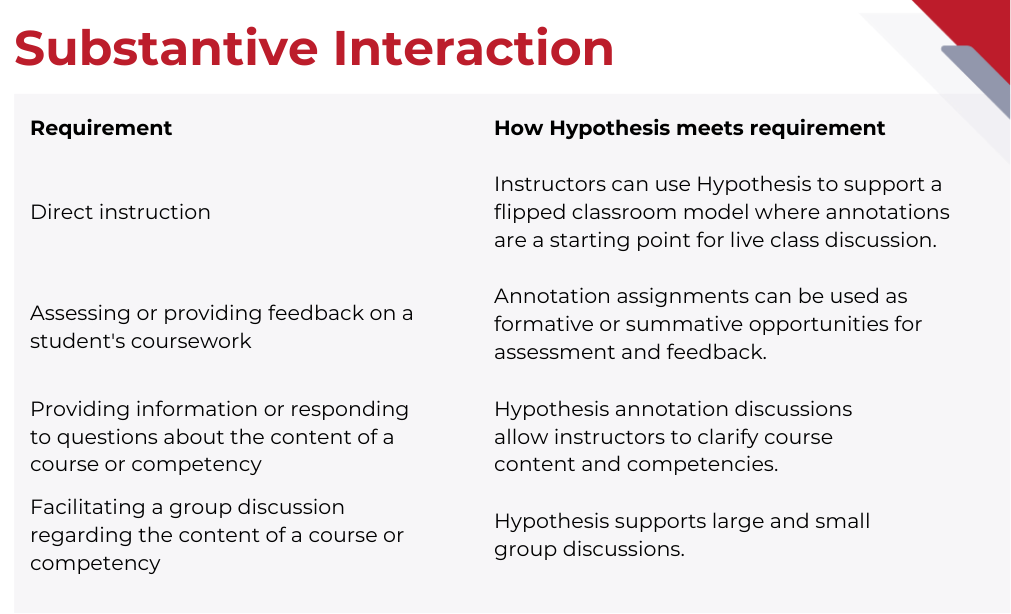What is Regular and Substantive Interaction (RSI)?
Regular and substantive interaction (RSI) refers to a specific set of interactions between instructors and students in the context of distance education. The U.S. Department of Education uses RSI to help differentiate distance education from correspondence courses. For a course to be classified as distance education—and thus qualify for Federal Student Aid (FSA)—it must include RSI, which is also crucial for meeting accreditation standards.
Regular and substantive interactions are instructor-initiated interactions. To meet the criteria for regular interaction according to the Department of Education, a course must provide students with frequent, meaningful opportunities to engage with the instructor. These interactions should occur on a consistent and predictable schedule, with the instructor actively tracking students’ progress and offering proactive support to ensure their success in the course.
The Department of Education recognizes the following types of substantive interaction:
-
-
- Providing direct instruction;
- Assessing or providing feedback on a student’s coursework;
- Providing information or responding to questions about the content of a course or competency;
- Facilitating a group discussion regarding the content of a course or competency; or
- Other instructional activities approved by the institution’s or program’s accrediting agency.
-
A course must have regular interaction and at least two types of substantive interaction to be considered distance education.
Why is RSI important?
Apart from Department of Education requirements, incorporating RSI into your course design and teaching is important for supporting active learning in your online classroom. Opportunities for discussion and feedback empower students by offering them occasions to monitor their learning and clarify misunderstandings. RSI also supports student success by increasing social presence in the online classroom, a space where some students can feel disconnected from their instructors and peers.
How does Hypothesis social annotation support RSI?
Hypothesis can be used to meet both regular and substantive interaction requirements.

Using Hypothesis for Regular Interaction: Regularly scheduled Hypothesis reading assignments offer predictable opportunities for instructors to provide feedback on student writing and to monitor and address questions or misunderstandings about instructional content as well as course documents such as syllabi, assignment instructions, and study guides. Additionally, instructors can now monitor student progress using the LMS Reporting Dashboard, which gives real-time updates on annotation counts and dates of student interaction.

Using Hypothesis for Substantive Interaction: Hypothesis offers an alternative to traditional discussion boards, where conversations can often feel repetitive and superficial. As an annotation tool, Hypothesis encourages students to reference specific ideas and concepts as they are discussing a text, supporting more authentic engagement with the content. For purposes of RSI, instructors can initiate interaction by using Hypothesis annotations to guide course readings, provide feedback on student annotations, respond to student questions, and facilitate small group discussions about course content. Additionally, instructors can add extra evaluative feedback to the Hypothesis assignment entries in the course grade book.
Hypothesis makes regular and substantive interaction possible on a range of content, including webpages, PDFs, YouTube and Canvas Studio videos, JSTOR articles, and VitalSource eBooks. Check out the Hypothesis blog for tips on facilitating engaging annotation discussions, including Replace Your Discussion Boards with Hypothesis Social Annotation, Leveraging Social Annotation for Regular and Substantive Interactions, and The Magic of Open-Ended Questions in Social Annotation.
The Hypothesis team offers workshops on social annotation and RSI for partner schools. Reach out to success@hypothes.is if you’d like to schedule a session for your team!
Please note that this blog post is not legal advice but rather a resource for learning more about supporting regular and substantive interactions through Hypothesis social annotation.